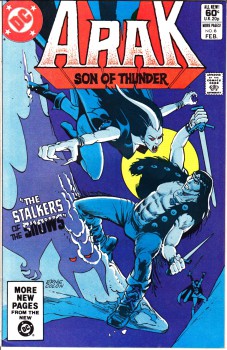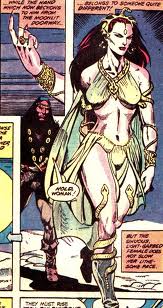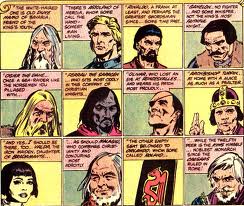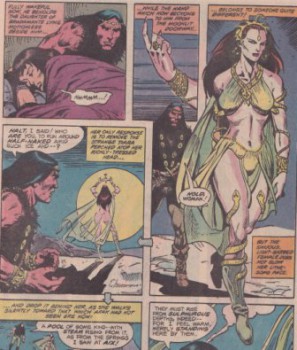ARAK Issue # 6: “The Stalkers of the Snows”
 Right off the bat (no pun intended), the cover tips us off that this issue will feature the blood-sucking undead!
Right off the bat (no pun intended), the cover tips us off that this issue will feature the blood-sucking undead!
In the eerie blue glow of the full moon, a vampire swoops down on sword-drawn Arak like a bomber lugging twin torpedoes. And, oh dear, those sharp fangs aren’t the only pair of pointy objects poised to pierce Arak or poke his eyes out. (Yeah, they’re hard to miss, framed as they are by the yellow moon.)
[Okay, the adolescent male has been sent back to his room in my psyche; now let’s summarize this issue with less juvenile eyes, shall we?]
We don’t get to any vampires until 19 pages in; this issue fits a recurring pattern of narrative structure that reserves the monster-of-the-month for the last five pages or so, while the first four-fifths of the issue covers court intrigue and character development that furthers the overarching plot.
Arak returns from being demon-flung out of the sorceress Angelica’s tent the night before, arriving at Carolus Magnus’s jousting tournament just in time to reveal to the Twelve Peers that Angelica’s brother Argalia cheated by using sorcery when he defeated the champion Rinaldo last ish. Also, by the way, her demons have carted off one of the Twelve, the court magician Malagigi, to White Cathay.
Most of the Twelve (well, they’re down to ten now, since one seat has been mysteriously empty and, of course, poor old Malagigi is a hostage to goat-footed devils) dismiss the charges of the “savage heathen,” since it is his word against Angelica and Argalia, who are both nobility and allegedly Christian.
The ensuing exchange rather amusingly ticks off Arak, who lays out a good case of circumstantial evidence and shows himself to be smarter than just about all the rest of them combined. Even Valda, usually stoically silent, intervenes, telling the rest of her Peers that they should heed the words of Arak.
All this gets her is a snickering remark from the Bishop: “Well, now! It seems rave Valda is smitten with the young savage!” Another one chimes in, “Perhaps we should call her the ‘Iron Maiden’ no more, eh?” Nudge nudge wink wink. Man, and you thought I was juvenile! These guys need a serious come-uppance.
 The more level-headed Carolus Magnus is conflicted; after all, as he counters to the scheming Ganelon, “Two nights ago, that ‘red one’ saved me from a Tree from Hell!”
The more level-headed Carolus Magnus is conflicted; after all, as he counters to the scheming Ganelon, “Two nights ago, that ‘red one’ saved me from a Tree from Hell!”
That indeed should count for something; I myself would feel duly indebted to anyone who rescued me from the clutches of any of a variety of mobile trees or other animate vegetation.
So Magnus does what any wise monarch would do — consults his wife. Her counsel is practical: “Which decision you make, Sire, is less important than the making of one. ‘Tis fatal for a monarch to seem torn by indecision!”
Alas, he jumps to the wrong decision. The decisive factor for this blunder is the fact that the champion Rinaldo — who was present the night before and could attest to Arak’s fidelity — remains silent. Only Arak recognizes that the blank gaze in Rinaldo’s eyes indicates he is now completely under Angelica’s ensorcellment.
Carolus Magnus’s misjudgment is met by Arak’s sharp-witted observation: “So — this is how I’m repaid for doing battle with the tree-god Irminsul!”
Yes, Arak, welcome to the aristocracy.
 Magnus decrees that the tournament continue, with Arak to be taken into temporary custody. Arak refuses, taking out the king’s men-at-arms who try to apprehend him (but not lethally, as he respects that they are the king’s men). Argalia sends in his remaining two mute giants to help against the Native American (his other two were taken down by Arak last ish). This is where Valda steps in to lend a sword-hand to Arak.
Magnus decrees that the tournament continue, with Arak to be taken into temporary custody. Arak refuses, taking out the king’s men-at-arms who try to apprehend him (but not lethally, as he respects that they are the king’s men). Argalia sends in his remaining two mute giants to help against the Native American (his other two were taken down by Arak last ish). This is where Valda steps in to lend a sword-hand to Arak.
Valda cuts down the remaining giant and pumps her fist in the air, declaring, “Well, Arak? You’d best be able to prove your charges against the Cathayans now, at least in trial by combat — or we may both feel the headman’s axe, ere long!”
Arak is so impressed by Valda’s passionate display that he does an ill-advised thing: he grabs her by the shoulders, enthusing, “Our Viking wenches, back north, were hellcats in their own fierce way, but you — ”
To which Valda shoves him away, saying, “What? Unhand me, savage! Hear me! I fought beside you because we have been comrades in arms. Don’t seek to make more of it, by calling me your wench!”
Arak stutters, “But — I did NOT! — ” Which, technically, is true.
This tense moment is broken by Argalia deciding now would be a good time to run Arak through with his magical lance.
This royally pisses off Carlous Magnus, who feels things are devolving well out of his control: “MOTHER OF ALL MERCY! Does a King’s word stand for nothing any more? See how armored knight does charge ‘gainst a naked savage!”
Lemme summarize the next few pages here quickly, so’s we can get to the juicy stuff — the vampires, not to mention the further ratcheting up of romantic tension between Arak and the Iron Maiden…
First, though, I failed to mention in my blog of issue 5 that it was the first issue in which a female did not make some comment about Arak’s charismatic effect on the ladies. This issue restores the tradition, with Angelica parrying her brother’s whining lament that she should have let him kill Arak back in Northumbria (way back in issue 1) by noting, “He…appealed to me. But I can no longer afford to indulge myself. Your lance, Argalia.”
Magical lance or not, Argalia is no match for the clever, quick-witted Arak, who waits until the last instant to move, leaping atop the lance to counter-balance Argalia, who is flung like a pole-vaulter overhead…right into the path of his horse “whose massive hooves beat a thudding cacophony upon his yielding skull.” Exeunt Argalia.
Her brother dead, Angelica takes her leave in dramatic fashion, summoning a giant demon who grabs her in its fist and vanishes.
Arak thus exonerated by this hellish display, Magnus must gravely mutter, “We…owe you an apology most profound, fire-skin.”
If I’m Arak, I’m thinking, “You bet your sweet bippy you owe me an apology. And I don’t care how profound you say it is, what are you going to do in action to back those words up?”
Well, first he summons Arak to a private consultation in his tent, along with his trusted advisor, the monkish scholar Alcuin. This fellow looks a little shifty, and I smell a rat when the King has Alcuin write up a Kingly decree, a scroll Arak can present in order to be “equally well-received by Pope in Rome, or Empress in far-off Byzantium. Say that this red warrior is on a mission for Carolus Magnus — and all aid and succor will be duly appreciated.” You see, writer Roy Thomas makes a point of the fact that Carolus Magnus needs a couple minutes even to spell out his name when he signs it, highlighting the fact that he is illiterate. Nor would Arak be able to read Frankish, so we’re left to wonder what that monk really wrote on there. Is this a Rosencrantz and Guildenstern moment? Is the first monarch Arak presents it with going to read, “Carolus Magnus would be dreadfully grateful if you would hang this red-hued barbarian here; it really would save him a mess of fuss and trouble”?
Magnus regretfully explains that neither the other Peers nor himself can go off to Cathay to rescue Malagigi, “because, callow youth, Frankland is ringed with foes who would descend upon my kingdom like wolves if I left her borders now.” However, if Arak should go and bring his wizard back, he’ll have a nice reward waiting for him.
When Arak sets off on his next quest, Valda makes a spontaneous decision to leap upon her horse and go with him, and we are left to wonder if her choice is solely because, as she says, she likes Malagigi, or whether there might not be someone else she’s liking. Hint hint. Tension tension.
In their ensuing travel into the Alpines, we get a little backstory on Valda. She was the daughter of Bradamante, “the first female paladin, fighting alongside the King himself — aye, and the great knight Roland — yes, and the Malagigi, who it’s said looked not a wit younger then than when we beheld him last!” Her mother died “in the legend-birthing ambush of Roncesvalles Pass, where great Roland blew his ivory horn in vain ere he fell.”
Cool. Thomas uses his “alternate-real-world” backdrop to tie in a little direct connection to the knight Roland, imbuing Valda’s story with some fun resonance for those familiar with those old legends.
Then it’s snowing. And they come upon a breathtaking sight, which I’ll let Arak describe:
“Those men — and a woman or two, as well — FROZEN IN ICE! And that great hulking BEAST — with ears like tent-flaps and tusks far greater than any sea-unicorns I ever saw — ! ”
Valda explains that they are beholding an elephant and “a part of Hannibal’s army that got lost hereabouts — complete with camp-following hussies!”
With a promise to tell Arak more about Hannibal and his campaign of a thousand years earlier, Valda notices that there is shelter nearby — a completely abandoned hut that, mysteriously, is outfitted with wood for a fire and everything else they’ll need to pass the cold night. Sneaky suspicious…
Of course, as Admiral Ackbar might’ve told ‘em, it’s a trap. And now, nineteen pages in, we get our monsters.
 Oh, I have to mention this wonderful little exchange first: they have to share Valda’s cloak for warmth. When Arak protests that it will not be large enough to cover them both, she notes that it will be fine if they “don’t roll about…and my sword impaled between us should prevent that.”
Oh, I have to mention this wonderful little exchange first: they have to share Valda’s cloak for warmth. When Arak protests that it will not be large enough to cover them both, she notes that it will be fine if they “don’t roll about…and my sword impaled between us should prevent that.”
This provokes Arak to note that he’d heard stories told him by his mentor Hermold of Frankish knights who would lay a sword “between them and their ladies.”
To which Valda logically responds, “I am a knight, Arak…or had you forgotten?”
“How could any man? Sleep well, Iron Maiden.” Arak, sword at his back, rolls over and drifts into an eventful sleep.
He is awoken by the touch of a woman, but not the woman of iron dozing beside him. It is a visitation by a “sinuous, light-garbed female” who is definitely not dressed for this environment. Arak arises and follows her outside the tent to a warm pool, a natural sulphurous spring. She dives in, and he dives in after.
Meanwhile, the scenario is repeated with the visitation of a “young Adonis” to Valda. She, too, follows him outside the tent, even though “she knows … that she is not acting rationally, even by medieval standards…” And I have to say, that bit of narration by Thomas cracks me up. Even by medieval standards, you do not follow naked men into the snow!
He removes her cloak and beckons her to doff her armor and join him in a hot spring. Incidentally, it seems that this will be a recurring theme: supernatural beings of various ilk luring Valda to get nekkid, the unfettered freedom of which she always finds tempting. This time, however, it is thwarted by her noticing that he does not cast a reflection on the water. She immediately realizes he is a vampire, but in fighting back she finds herself slow, sluggish, mesmerized by his “withering, unearthly stare.” She just manages to cry out Arak’s name as the blood-sucker overpowers her.
Things look bad for Valda, as well as Arak, who has pulled himself to the bank of the “hot spring” only to realize that there are icicles forming on his fingers and hair. He was being lured to a freezing death, and it was only hearing Valda yell his name that has broken his stupor. This happens just in the nick of time, as his temptress emerges to reveal her true form: “Aye, blood-full one! And if you think that strange red skin of yours grows pale now — !”
The vampiress leaps upon him, sinking her fangs in his neck. He cries out “Valda — !”, which serves to give her a momentary boost of strength and focus — just enough for her to throw her assailant off balance. As they roll down a snowbank, she manages to plunge her sword into his heart.
Meanwhile, a desperate, weakening Arak manages to clamber up to the elephant frozen in ice. In a bit of deus ex machina, Valda appears with his sword. She tosses it to him, but it lodges itself into the ice. Arak grabs the hilt as a handhold, and the ensuing scramble dislodges enough shards of ice to cause an avalanche. The ice, along with its frozen corpses, rolls down the hill onto the vampiress. This sets up a nifty visual: when the billowing clouds of snow dissipate, the undead temptress is impaled on the elephant’s tusk. How convenient…Hey, improbable, but it’s only a comic-book and you have to give them props for novelty.
Arak and Valda, both having saved the other by screaming out each other’s name, ride off to continue their quest…But what psychological, Freudian hints can we read into this night? Their temptation came in a sexual form, as they were sleeping beside one another, Valda’s sword cutting a sharp demarcation between them and their mutual attraction.
Well, this has been a fun read. Next time it’s “Creatures of the Catacombs,” and we’ll find out if Arak and Valda can go a second night together both preserving Valda’s honor and preventing themselves from being fed on by supernatural beings.
Oooo, I like the sound of this issue. I mean, really, how often do you get vampires and Hannibal’s elephants in the same story? 🙂 It sounds like Thomas is having a lot of fun creating his world here.
Out of curiosity, what are the readers responding to? I assume there was a letter column? Or is this one of those books where the comments come in very sporadically?
I’ve noticed that things always get extra weird when elephants are added to sword and sorcery, especially when Roy Thomas is at the writer’s helm.